A look back: the West Side Story archives
The West Side Story has been producing content since the 1960s. Students have covered an array of topics since then, and these are the stories behind the stories.
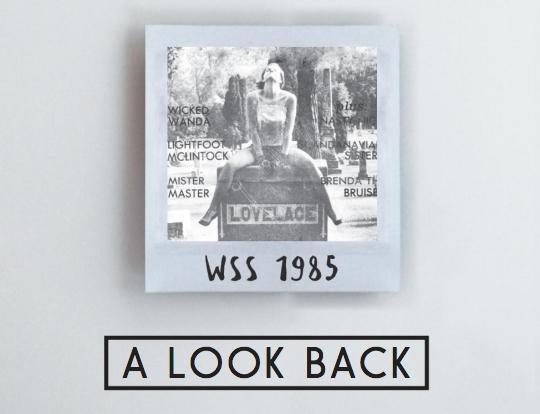
Although many readers may only be familiar with the sleek, in-color West Side Story, there was a time when the paper contained stories about Beatlemania, Nixon and student animosity toward ITEDs. Well, some things never change.
The WSS’ first issue came out in 1969, and since then―the WSS has made a tradition of reporting on issues that matter. Here are some that make us look back in wonder.
1977 “Teacher’s Lounge: ‘Where do we smoke?’”
As high schoolers today, one thing we’ve never had the chance to debate is where teachers should be able to smoke on campus. Peter Van Allen, a WSS editor at the time (who has since done freelance journalism for the New York Times and now works as the editor for Mainebiz), got the idea to do a photo survey in high school from the “man on the street” technique he saw in the SoHo Weekly News. The technique allows a photographer to gauge the reaction of the interviewee and grab a quote or two on how they feel. The photo survey asked teachers their opinions regarding the recent ban of smoking in the teacher’s lounge.
The photo survey included teachers in disagreement, as some talked about how the ban was handled unfairly, while others said it encouraged teachers to interact with students during lunch. One teacher even proposed having a smoking and a non-smoking lounge.
“I can’t believe I was brave enough to talk to those teachers,” Van Allen said via email. “I used the [man on the street technique] many times over my career. The key is working with a good photographer. When someone on the street is approached by a camera person and a reporter, it’s much less threatening than if a single reporter walks up.”
Some teachers were more than willing to express their opinion on the situation. Ben Van Zante, West High’s journalism adviser from 1971-2000, spoke about former English teacher Brooke Workman, who was featured in the story.
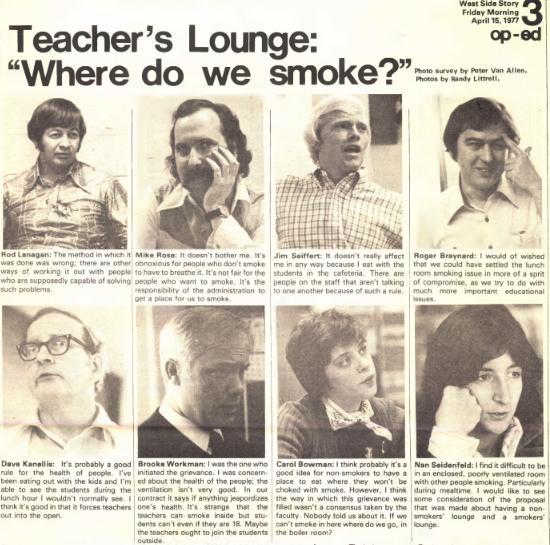
“The teachers’ lounge wasn’t really a lounge. It was a storage room for the cafeteria,” Van Zante said. “That’s where everybody ate. And Brooke said, ‘this is not a healthy situation.’”
On the previous page in the 1977 issue, there is a column entitled “No Smoking,” expressing the stance of the editorial board. It suggested enforcing a no-smoking rule for everyone during the school day.
“Eliminate smoking in public places unless providing separate rooms or partitioning off smokers is possible,” it reads. “The smoker’s right to smoke ends where the non-smoker’s air for breathing begins.”
Little did the authors know, it would take over 30 years for Iowa to pass such a law. In 2008 The Smokefree Air Act was passed. It “prohibits smoking in almost all public places and enclosed areas within places of employment.” Almost word-for-word, the students predicted what was to come.
1985 “Pornography: More than meets the eye”
High schoolers can often be wary covering controversial topics, but this 1985 WSS cover story on pornography refutes that.
“I’m not sure [this] was a burning story that was preoccupying everyone at the time. But there was definitely an effort to censor song lyrics in albums at the time, so issues of censorship were in the air,” said the writer, Josh Barkan via email. “To me, it feels like an earnest piece of journalism. Maybe a little too earnest.”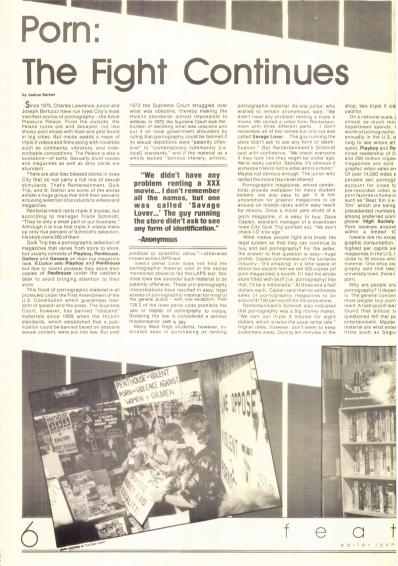
Barkan recalls getting inspiration for the story near the dumpster behind a store. By the dumpster were pieces of film containing pornography, and from that he began to look into the world of buying and selling porn.
“I tried to teach the kids that they had to be pretty thorough,” Van Zante said. “They couldn’t publish something if they didn’t have evidence for what they were talking about.”
Accordingly, Barkan set out to find his evidence. The article features West High students who admitted to purchasing pornography, and store owners in denial.
As one junior, who wishes to remain anonymous said,
“We rented a video from Rentertainment with three different parts … I don’t remember all of the names but one cut was called Savage Lover … The guy running the store didn’t ask to see any form of identification.” But Rentertainment’s Schmidt said with confidence, “We check everyone if they look like they might be under age. We’re really careful. Besides, it’s obvious if someone tries to rent a video and is a minor.”
Maybe not obvious enough. The junior who rented the movie has never shaved.
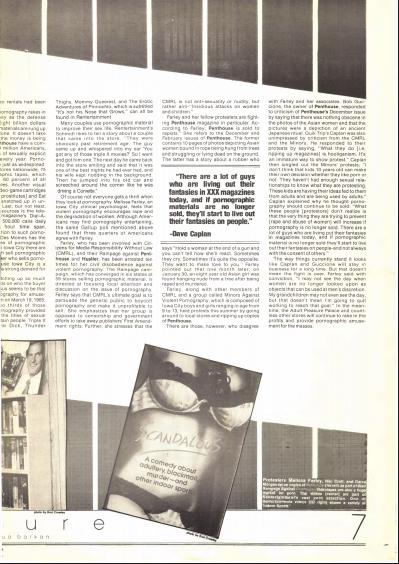
Barkan recalls the article being received “without much fuss,” but another student on the WSS staff attempted to draw attention to a much more controversial topic at the time: homosexuality.
“The one thing that created a stir is that a student at the time, used the paste-up board, [this is how designers used to lay out the WSS, by cutting and pasting strips of text] to add the words ‘Josh is gay’ at the bottom of the second column. It so happens that I’m not gay. I’ve been married to two women, and I’m not [bisexual] or in the closet,” Barkan said. “What I’m getting at is that being openly gay in those days was something much more controversial than it is now. So I think that once I started writing an article about something more risqué—the selling of porn—it led to this little ‘sabotage’ of the piece.”
Barkan is currently a writer and professor of creative writing at Hollins University. In high school, he wanted to become a journalist. He also wrote for The Daily Iowan in addition to WSS, and is able to pinpoint the moment he decided journalism may not fit the type of writing he wished to pursue.
“I told the editor [at The Daily Iowan] I hadn’t been able to investigate the whole story and all the facts by the deadline. There was more to say, which felt important. But the editor said the story just had to print at the deadline,” he said. “Eventually, I became much more interested in the aesthetics of writing, and there was less place for that in standard journalism.”
Barkan has a new collection of short stories coming out Jan. 2017 entitled “Mexico”. It can be found on Amazon and Barnes and Noble.
1970 Teaching Sex: Mike Roe
One story that continues to pop up through years of archives is a continuum of coverage on a man named Mike Roe. Roe was a teacher at West High in the ’70s who was fired for reasons not quite specified.
The book Stop the Presses! I Want to Get Off!: A Brief History of the Prisoners’ Digest International (Voices from the Underground) did an entire piece on the story of Mike Roe.
According to this book, Roe brought in members of the Iowa City Gay Liberation Front to class to discuss their lives and interactions with the straight society. Parents that found out went to the board of education, and Roe was set to have a hearing. WSS covered this incident for over a year.
“How Mike Roe got that [teaching] job, I don’t know for sure,” Van Zante said. “Mike had this rag-tag bunch of students, mostly boys, and they were the smokers, they were the troublemakers, they were the students who were more controversial than some of our others.”
Roe came to West High after teaching at South East Junior High. Van Zante explained that he was brought to West so the principal at the time, Ed Barker, would be able to “get the goods” on Mike so they had the grounds to terminate his contract.
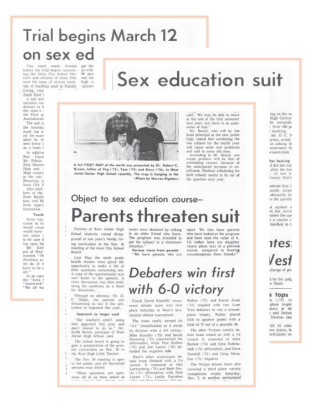
“You can see by the stories that he was controversial,” Van Zante said. “That was one of the things that kept some of the kids in school. That was his method.”
According to Van Zante, Roe supposedly didn’t really “teach” a class, but rather provided a space for the at-risk kids.
“They had their own room on the bottom floor of the school, and it was full of couches and overstuffed chairs,” said Rox Brandstatter, who wrote over four articles for WSS about Roe. “The atmosphere was very relaxed, and there wasn’t a lot of traditional academic teaching taking place, which may have been one of the problems in the eyes of the administration.”
One article in WSS explains what parents wrote to the school board. They were worried about the incident in his sexual education class, and wanted to use it as a way to get rid of sexual education indefinitely.
“They are also concerned with the effects such a course could have on their children,” the article read.
The parents cited in their letter that in Sweden, such a class increased rates of sexual promiscuity and mental illness.
Roe was ultimately fired after a hearing, and there is no information on where he went following his debarment.
Attempts by WSS to contact Roe were unsuccessful.
1969 Cream of the Crop
In the 1969 “Cream of the Crop” section (senior superlatives), Kerry Keough Siekmann was voted “Best all around” by her peers.

“It meant that my peers saw something positive in me … not in a particular area, but in general,” she said via email.
When asked if she feels she has lived up to this honor, Siekmann exemplified her “all around” mantra as she explained her career path; which has taken her from accounting to modeling.
Siekmann now serves on the City Planning Commission in Carlsbad, CA.
“I have been very fortunate to do many things in my life,” she said.
It’s no surprise she was chosen by her peers as “best all around”.
To access the complete collection of WSS archives, click here.
Your donation will support the student journalists of West High School. Your contribution will allow us to purchase Scholarship Yearbooks, newsroom equipment and cover our annual website hosting costs.

Nina Elkadi is a senior at West and a third-year staffer. She is the Print Editor-in-Chief this year and would like to thank Kanye West for helping her...



Julie VanDyke • Dec 30, 2016 at 2:55 pm
Hmmmmmm, interesting, 1981-82, 1982-83, and 1983-84 are not available? Those are some of the insane Reagan years…Perhaps there should be an attempt to locate or recreate those. Mr. VanZant, do you know where they or pieces of them could be? 1983-84 was the arrival of the previous “caretaker”, bahahahaha.
Julie VanDyke • Dec 30, 2016 at 2:49 pm
Oh Dr. Workman, you were a great teacher…It’s been about 33 years since I took my last class with you but I learned a great deal in your Humanities of the 1960’s and The American Way of Death classes and still remember a lot from it. I wish you were alive and lucid enough to ask some questions of. I’m glad to have made you proud enough to tell the teacher’s lounge of the under my breath response to the lame answer you received from the Iowa City Mayor to a question I still remember. Thank you for everything you made us think deeply about.
Teresa Stidham • Dec 29, 2016 at 8:38 pm
Loved seeing the picture of my wonderful friend and teacher, Carol Bowman….lost her to soon.